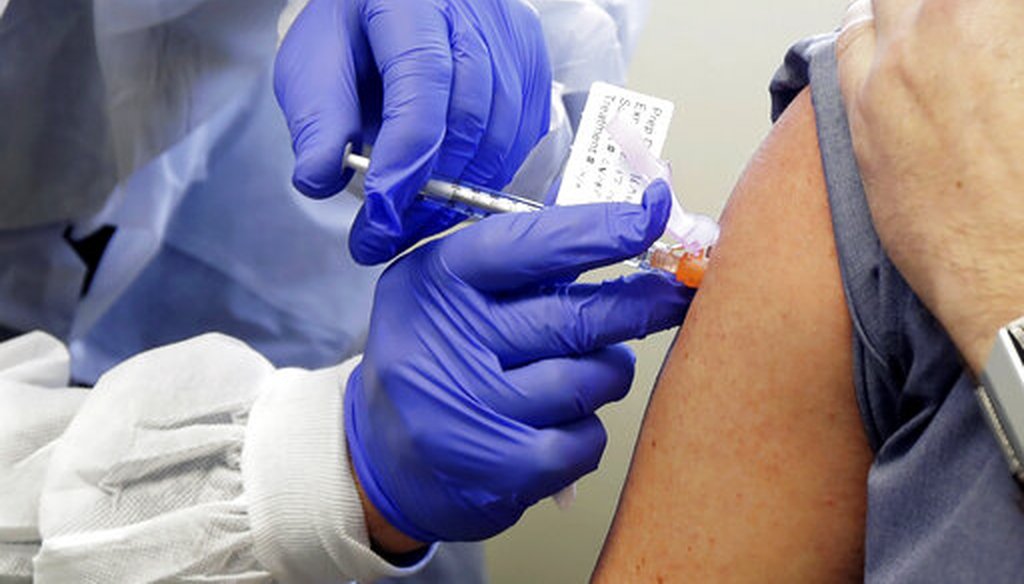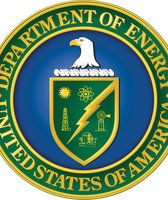Stand up for the facts!
Our only agenda is to publish the truth so you can be an informed participant in democracy.
We need your help.
I would like to contribute

Neal Browning receives a shot in the first-stage study of a potential vaccine for COVID-19 on March 16, 2020, in Seattle. (AP)
If Your Time is short
• The long-cited 12-to-18 month timeline to an effective vaccine is probably still on track, though meeting that deadline will require everything going right.
• There are more than 100 vaccine projects under way across the globe. At least eight efforts have moved to the early clinical trial phase.
• Based on the emerging evidence, experts are cautiously optimistic about whether a vaccine could confer at least some immunity, and that mutations in the virus won’t be too fast to stymie vaccine development.
Americans are counting on a safe and effective vaccine against the novel coronavirus. Two months into the pandemic, is the U.S. and the world any closer to one?
The short answer is yes, experts say. But creating an effective vaccine will still require a lot to go right.
There are more than 100 vaccine projects under way worldwide, according to the World Health Organization. At least eight of them have moved to the early clinical trial phase. Four of these vaccines were created in China, one in the U.K, one in the European Union, and two in the United States. Others could move to clinical trials in the coming months.
Having so many potential vaccines in the testing phase is impressive, experts say, considering the short time scientists have known about the novel coronavirus.
"Multiple groups from government, industry, and academia have come together to forge partnerships that advance candidate vaccines," said Matthew B. Laurens, an associate professor of pediatrics at the University of Maryland School of Medicine’s Center for Vaccine Development and Global Health. "The shift from other research activities to this urgent public health crisis is both encouraging and exactly what needs to happen."
Sign up for PolitiFact texts
In early April, Kathleen M. Neuzil, director of the Center for Vaccine Development and Global Health at the University of Maryland School of Medicine, told PolitiFact that if all went well, there might be five or six vaccines in trials within six months. Five weeks later, there are already more than that undergoing trials.
Officials including Anthony Fauci, director of the National Institute of Allergy and Infectious Diseases, have remained consistent in their estimation of the timeline for creating a workable vaccine: 12 to 18 months. That’s a much shorter time frame than for previous vaccines, which have taken between four years and several decades. But given the intense pressure of the coronavirus pandemic, standard development and production models are being telescoped.
Here’s the state of play on coronavirus vaccine research, and how developments in the past two months have changed the outlook.
What are the leading vaccine candidates?
The one that has attracted the most attention so far is being developed by researchers at Oxford University in the U.K.
It uses a weakened version of a common cold virus that has been modified so it doesn’t cause sickness in humans. Researchers then added proteins, known as antigens, from the novel coronavirus, in the hope that these could prime the human immune system to fight the virus once it encounters it.
Testing by the U.S. National Institutes of Health found that one dose of the vaccine prevented rhesus macaque monkeys from getting sick after being exposed to large amounts of the virus. The vaccine has now moved on to clinical trials with 6,000 volunteers.
The Oxford team is working in partnership with global pharmaceutical giant AstraZeneca to manufacture several million doses by September — an even faster timetable than the 12-to-18 month goal.
"That’s pretty out in front, so they must be very confident," said William Schaffner, a professor of preventive medicine and infectious diseases at Vanderbilt University Medical Center.
Several other vaccine efforts have moved forward as well. Some are using a different approach that uses genetic material, known as mRNA, that provides the instructions for a body to produce the needed antigens themselves. This is a relatively untested approach to vaccination, but if it works, it has aspects that could simplify the manufacturing process.
One of the vaccine candidates using this method is being developed by the U.S. pharmaceutical company Moderna. Backed by federal funding, the vaccine has been approved for a second round of clinical trials. If successful, a third trial could come this summer. The company has partnered with a Swiss company, Lonza Ltd., to produce as many as a billion doses annually.
Another mRNA vaccine is being developed by drug giant Pfizer and BioNTech, a German company. Clinical trials are under way.
Meanwhile, Inovio Pharmaceuticals, a U.S. company, is working on a vaccine that uses a similar approach to mRNA but using DNA material instead. This effort is receiving funding from the Bill and Melinda Gates Foundation and the Department of Defense, among others.
Then there are the four vaccines being tested in China. Three of these use a more traditional vaccine method that involves a killed, and thus safe, version of the novel coronavirus. Another one uses a similar approach to the Oxford group.
Other companies are expected to start trials within months.
The pharmaceutical company Johnson & Johnson, in conjunction with a division of the U.S. Department of Health & Human Services, has chosen a lead candidate for its vaccine. It has not yet begun clinical trials, but executives have publicly pledged to start producing it late this year and to deliver 1 billion doses in 2021, assuming it’s shown to be safe and effective.
And the French company Sanofi is aiming to begin clinical trials this year for a vaccine it is developing that’s a variation on one originally used against SARS, an earlier coronavirus that caused outbreaks in Asia two decades ago.
The fact that several vaccine approaches are being tested, with more on the way, is a positive development, since it means we aren’t putting all of our eggs in one basket.
Should we worry about recent findings about coronavirus immunity and mutations?
One concern is whether, and how long, a person will have immunity from the coronavirus after either being infected. If the coronavirus doesn’t inspire immunity of any significant length, that would undercut the idea of attacking it with a vaccine.
We don’t know the answer yet, but scientists are seeing preliminary evidence that infection or a vaccine could confer at least some immunity.
For instance, a study by Chinese researchers published in Nature Medicine found that all 285 patients hospitalized with severe COVID-19 had developed a specific antibody against the novel coronavirus called IgM within two to three weeks of their first symptoms. The National Institutes of Health touted the finding as suggesting that "the immune systems of people who survive COVID-19 have been primed to recognize (the virus) and possibly thwart a second infection."
Another concern is that the novel coronavirus, like many other viruses, is mutating over time. If the virus changes enough, that could become a problem that bedevils vaccine researchers.
Experts hope the rate of change from mutations will stay manageable.
"There’s some fuzziness around the edges, but basically the virus is remaining stable," Schnaffner said. "This does not seem to be a virus that flips around and mutates a lot, like the seasonal flu. It doesn’t seem to be enough to cast a pall over the vaccine effort."
Is the 12-to-18 month timeline still on track?
In normal times, a vaccine trial occurs in several phases. But the coronavirus pandemic has thrown this longstanding model out the window, with each phase of the process needing to be shorter or handled on parallel tracks. The federal government has launched "Operation Warp Speed" to fast-track vaccine efforts, with a goal of 300 million doses available by January 2021.
Experts applaud efforts to create manufacturing and distribution capacity ahead of a vaccine being approved for wide use. Several pharmaceutical companies are moving forward with facilities, and the Gates Foundation is planning to fund factories for up to seven vaccines. A nagging problem, however, could be a shortage of appropriate packaging, akin to the shortages in swabs and reagents that have hampered the rollout of wide-scale testing.
One possibility for shortening the timeline is the use of "human challenge" studies, in which otherwise healthy, lower-risk volunteers are deliberately infected with the virus. This can produce much faster findings than simply waiting for the volunteers to encounter the virus in ordinary life. This approach was successful in the recent FDA approval of Vaxchora, a vaccine developed to prevent cholera, Laurens said.
All told, experts still have their eye on the 12-to-18 month goal.
"It’s predicated on absolutely everything going right," Schnaffner said. "So it’s optimistic. But I don’t think it’s too optimistic."
Our Sources
World Health Organization, "Draft landscape of COVID 19 candidate vaccines," May 11, 2020
National Institutes of Health, "Study Finds Nearly Everyone Who Recovers From COVID-19 Makes Coronavirus Antibodies," May 7, 2020
Harvard University, "RNA vaccines: a novel technology to prevent and treat disease," May 5, 2015
PolitiFact, "The race to create a coronavirus vaccine: A primer," April 6, 2020
New York Times, "How Long Will a Vaccine Really Take?" April 30, 2020
New York Times, "Pfizer Begins Human Trials of Possible Coronavirus Vaccine," May 5, 2020
Associated Press, "Hunt for a coronavirus vaccine heats up, but there’s no guarantee of success," May 5, 2020
NBC News, "Coronavirus vaccine: This week's updates from Moderna, Pfizer and more," May 8, 2020
NBC News, "The coronavirus appears to have mutated. What does that mean for contagiousness?" May 6, 2020
ABC News, "Is it possible to have a safe coronavirus vaccine by New Year’s Eve?" May 5, 2020
ABC News, "Revealing S. Korean studies show antibodies could thwart COVID-19 reinfection, spread," April 23, 2020
CBS News, "Why experts aren't too worried about COVID-19 patients retesting positive for the coronavirus," April 29, 2020
MarketWatch, "Oxford University scientists reveal coronavirus vaccine timeline as human trial begins," April 25, 2020
U.S. News and World Report, "AstraZeneca, Oxford University Partner to Develop, Manufacture Coronavirus Vaccine," April 30, 2020
USA Today, "To find a coronavirus vaccine, can we ethically infect people with a disease with no cure?" May 5, 2020
CNet, "When will the coronavirus vaccine be ready? Everything we know right now," May 5, 2020
STAT, "Mounting promises on Covid-19 vaccines are fueling false expectations, experts say," May 6, 2020
Politico, "Trump softens promise of coronavirus vaccine by end of year," May 5, 2020
The Hill, "Johnson & Johnson officer says goal is to deliver 1 billion coronavirus vaccines next year," May 10, 2020
Email interview with Matthew B. Laurens, associate professor of pediatrics at the University of Maryland School of Medicine’s Center for Vaccine Development and Global Health, May 7, 2020
Interview with William Schaffner, professor of preventive medicine and infectious diseases at Vanderbilt University Medical Center, May 8, 2020








































